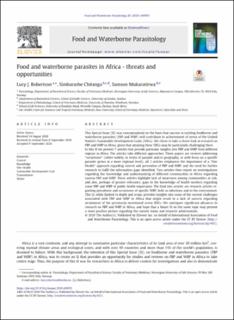| dc.contributor.author | Robertson, Lucy | |
| dc.contributor.author | Chitanga, Simbarashe | |
| dc.contributor.author | Mukaratirwa, Samson | |
| dc.date.accessioned | 2021-03-29T08:44:41Z | |
| dc.date.available | 2021-03-29T08:44:41Z | |
| dc.date.created | 2021-02-23T14:34:24Z | |
| dc.date.issued | 2020 | |
| dc.identifier.citation | Food and Waterborne Parasitology, 20, e00093 | en_US |
| dc.identifier.issn | 2405-6766 | |
| dc.identifier.uri | https://hdl.handle.net/11250/2735871 | |
| dc.description.abstract | This Special Issue (SI) was conceptualized on the basis that success in tackling foodborne and waterborne parasites (FBP and WBP) will contribute to achievement of seven of the United Nation's Sustainable Development Goals (SDGs). We chose to take a closer look at research on FBP and WBP in Africa, given that attaining these SDGs may be particularly challenging there.
In this SI we present 7 articles that provide particular insights into FBP and WBP from different regions in Africa. The articles take different approaches. Three papers are reviews addressing “occurrence” (either widely, in terms of parasite and/or geography, or with focus on a specific parasite genus at a more regional level); all 3 articles emphasise the importance of a “One Health” approach regarding control and prevention of FBP and WBP, and the need for further research to fulfil the information gaps identified. Two articles then report on investigations regarding the knowledge and understanding of different communities in Africa regarding various FBP and WBP. These articles highlight lack of awareness among communities at risk, and also, perhaps of greater relevance, gaps in the knowledge of health workers regarding some FBP and WBP of public health importance. The final two articles are research articles regarding prevalence and occurrence of specific WBP, both as infections and in the environment.
This SI, while limited in depth and scope, provides insights into some of the current challenges associated with FBP and WBP in Africa that might result in a lack of success regarding attainment of the previously mentioned seven SDGs. We anticipate significant advances in research on FBP and WBP in Africa, and hope that a future SI on the same topic may present a more positive picture regarding the current status and research achievements. | en_US |
| dc.language.iso | eng | en_US |
| dc.rights | Attribution-NonCommercial-NoDerivatives 4.0 Internasjonal | * |
| dc.rights.uri | http://creativecommons.org/licenses/by-nc-nd/4.0/deed.no | * |
| dc.title | Food and waterborne parasites in Africa - threats and opportunities | en_US |
| dc.type | Peer reviewed | en_US |
| dc.type | Journal article | en_US |
| dc.description.version | publishedVersion | en_US |
| dc.source.pagenumber | e00093 | en_US |
| dc.source.volume | 20 | en_US |
| dc.source.journal | Food and Waterborne Parasitology | en_US |
| dc.identifier.doi | 10.1016/j.fawpar.2020.e00093 | |
| dc.identifier.cristin | 1892787 | |
| cristin.ispublished | true | |
| cristin.fulltext | original | |
| cristin.qualitycode | 1 | |

